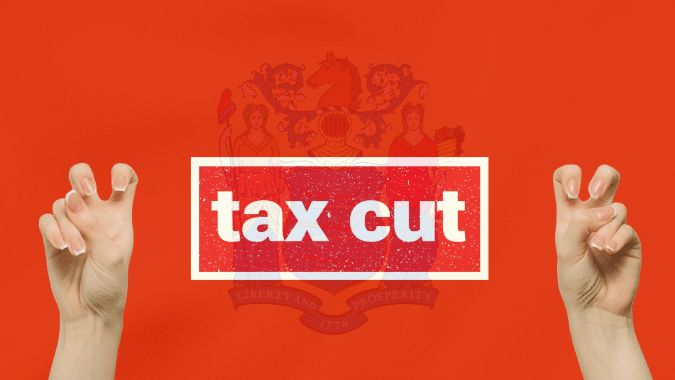On behalf of our member companies that make NJBIA the largest business association in our state, thank you for the opportunity to speak with you today in opposition to Governor Murphy’s recently proposed FY2025 (FY25) State Budget.
A lot has changed in a year after NJBIA testified to this committee about the FY24 proposed state budget being the most pro-business of Governor Murphy’s administration, and a lot has changed in just a few weeks from when Governor Murphy openly committed on a radio interview to NOT increase business taxes saying “We are top four in the country for corporate tax rate. So, we’re already a very expensive state…. We also have to be cold-blooded about our economic strategy. We need the jobs that those big companies bring to New Jersey.” Contrary to those positions from last year and last month, Governor Murphy proposed a Corporate Transit Fee in his FY25 state budget which is a permanent and a retroactive restoration of the expired Corporate Business Tax (CBT) surtax amounting to a 2.5 percentage point surcharge on corporations with over $10 million in earnings. This, once again, returns New Jersey to the highest state corporate tax rate in the nation. And this budget is built on that massive 20% increase in business taxes totaling more than $1 billion, a terrible and short-sighted policy compounded by the fact that it is unnecessary. The budget also includes other tax increase and spending increase decisions which hurt our business and fiscal climate, such as a largely conceptual tax on trucks going to our New Jersey warehouses that will hurt our important logistics, retail and manufacturing industries as well as add costs to everything.
WHY THIS SUDDEN CHANGE?
The business community and taxpayers in general (because we know all tax increases are spread throughout our economy) are forced to ask why. Why is this massive tax increase necessary? Why was a business tax increase that discourages capital investment and productivity growth chosen as the tax to increase? What is the purpose of the larger surplus that Governor Murphy deserves credit for establishing if it is not used to stabilize spending and taxes when revenues are temporarily down? Why has this massive increase in spending over multiple budgets been needed? Unless the state sees a public policy positive with having an anti-growth tax environment and the highest corporate tax rate in the nation, it is challenging to see why.
IS IT THAT THERE IS NO IMPACT ON THE ECONOMY FROM HIGH BUSINESS TAXES?
NOT at all! Having the highest corporate tax rate in the nation hurts New Jersey’s economic competitiveness for the creation and attraction of jobs and capital because corporations can choose their investment locations that give them the best return on investment. We all know New Jersey is a high-tax state, and currently, our State has the third worst unemployment rate among our 50 states, and we ranked in the middle of the states in the most recent quarter for our growth in state GDP. In the five previous quarters, New Jersey has only surpassed the national average in growth once. Also troubling is that our labor force, which grew after the initial declines from the pandemic and into early 2023, has now consistently declined through the second half of 2023. Our New Jersey economy is certainly not where we would all want it to be.
New Jersey has an unrelenting tax environment where we are the only state in the nation that is in the top tier of the four major taxes: the highest corporate tax rate if this proposal becomes law, the highest property taxes, among the highest top individual income tax rates and a high state sales tax rate. The NJBIA research attached to the back of this testimony shows how we rank poorly in our region in the costs that businesses face, and that worst ranking in the region already hurts our competitiveness. We cannot afford to make a dire situation worse.
On top of that, New Jersey’s corporate tax actions are not in a vacuum, because Pennsylvania, New Jersey’s neighbor just across the Delaware River that we compete with for jobs and capital, is already in the middle of a bipartisan and multi-year path to cut its corporate tax rate in half, from 9.9% to 4.9%. This means New Jersey will fall further behind. Other states like North Carolina and Indiana (both had a multi-year phase down of their corporate tax like Pennsylvania is in the midst of) have demonstrated the clear job and new business creation benefits of lowering their corporate tax rates. North Carolina’s job creation of 2% per year and new business creation of 3% per year since their bipartisan tax cuts were implemented show that it has been so successful that they recently signed new legislation there to further lower their corporate taxes and eliminate them entirely by 2030.
What is also misunderstood about business taxes is that they are not just on the business, which obviously hurts their competitiveness, but they are spread around to their communities and the other small businesses with which they contract. So, any new tax further adds to the affordability problems that everyone in New Jersey acknowledges. New Jersey, already one of the most expensive states in the nation, will never become more affordable due to a business tax increase, especially a billion-dollar one.
IS IT THAT THE SINGLE SALES FACTOR TREATMENT OF CORPORATE BUSINESS TAXES IN NEW JERSEY MAKES HIGH CORPORATE TAXES IRRELEVANT?
Certainly NOT! Some advocates that want New Jersey to have the highest corporate tax rate in the nation incorrectly assert that New Jersey’s single sales factor treatment of corporate tax liability make our state immune from any competitiveness impact. This very flawed thinking just shows these advocates’ lack of understanding when it comes to corporate taxation and business in general. Much of the taxable sales activity subject to our CBT is not from consumer sales and operational income that the advocates refer to, but from business-to-business sales and other income like interest, dividends, royalties, rent and capital gains. Particularly for corporate taxpayers headquartered in New Jersey, that income is often assigned to New Jersey, thus an incentive to be located in a lower tax jurisdiction. Additionally, the states mentioned earlier in this testimony that saw growth from corporate tax cuts were also single sales factor states.
IS IT THAT NEW JERSEY HAS RETURNED TO MINIMAL BUDGET SURPLUS LEVELS AND IS FACING AN AUSTERITY BUDGET WITHOUT THIS MASSIVE BUSINESS TAX INCREASE?
It is laughable to say that our state budget is anywhere remotely close to an austerity budget after being the highest it has ever been at $55.9 billion, up $1.6 billion from last year and up 61% in just seven years. And that budget seven years ago that was more than $20 billion less had a surplus of only $555 million – only about 9% of the $6.1 billion surplus in the proposed FY25 budget. The proposed FY25 budget fully funds pension payments and school aid for the first time, and it maintains a lot of other recent spending growth. Governor Murphy deserves credit for building up that surplus so that New Jersey now has a healthy fiscal tool to stabilize spending and taxes when revenues are temporarily down. The public policy goal is not to have a surplus in and of itself, but the public policy goal is to be able to use a surplus to avoid a painful spending cut (something like pension payments and school aid which were often irresponsibly cut in the past when budgets were tight) or tax increase when revenues are unexpectedly down. Then when the revenue situation improves, the surplus builds back up before the next dip. Budgets decades ago, under both Republican and Democratic administrations, were faced with extraordinarily tough choices because of a small surplus, so those hard tax increase and spending cut decisions should now be avoided after the surplus has been built up. That should include using the budget surplus to avoid a 20% increase in business taxes that will harm our economic growth. If this tax remains, it is akin to increasing taxes just to be able to put more money in the bank. This tells the business community that this decision is punitive, which would do further damage to our business reputation nationally and internationally.
IS IT THAT A CORPORATE BUSINESS TAX INCREASE DEDICATED TO NJ TRANSIT IS URGENTLY NEEDED IN THIS FY25 BUDGET AND MAKES TOO MUCH SENSE?
Transportation infrastructure investments are important, but NJ TRANSIT does NOT urgently need them now. In an interview with NPR just two weeks before his budget address, Governor Murphy said the same exact thing. And dedicating corporate taxes towards NJ TRANSIT makes little sense. To begin with, NJ TRANSIT’s fiscal cliff that this massive business tax increase is supposedly covering is not until next year, so why would the state want to take a billion dollars away from the private sector a year earlier than necessary.
As for the reasoning behind the dedication, no other state dedicates corporate taxes towards a mass transit agency because it is poor policy for several reasons. Pennsylvania just next door has even shown how their mass transit investments to SEPTA can increase while their corporate taxes are being reduced. First, if we prioritize stable transportation investments, as New Jersey should, why would we use a notoriously volatile and unpredictable revenue source like CBT to do that? Also, good tax policy is to make revenue more like a user fee with a nexus between what you are taxing and what you are paying for such as with gas taxes and tolls. Where is the nexus for a south or northwest New Jersey business paying significantly higher taxes to support a mass transit system they and their employees do not benefit from or even have access to? We have even had large members with campuses in the central and northern parts of the state tell us their employees don’t use NJ TRANSIT. Lastly, a tax dedication inherently implies some kind of permanence unlike the temporary CBT surtax that this new business tax is replacing. It is questionable public policy to do anything permanent to the CBT when there is so much about business taxation right now that is up in the air and very uncertain such as with the possible expiration of the corporate tax changes in the 2017 Federal Tax Cuts & Jobs Act, President Biden’s just proposed increase in federal corporate taxes and how the shift to remote work will impact business taxes. The prior CBT surtax was temporary, which makes policy sense and also makes it much more business friendly. A permanent CBT increase versus a temporary increase almost has a double hit to businesses. First, it impacts the cash they lose and give to the state which happens in both temporary and permanent taxes, but then a permanent tax increase also hits a public traded business’s balance sheet and stock value that a temporary one does not. The permanent dedication of this tax increase makes this worse in some ways than the prior CBT surtax.
IS IT THAT THERE IS NO ALTERNATIVE TO FUND NJ TRANSIT AND OTHER TRANSPORTATION NEEDS?
This is NOT the only option to address NJ TRANSIT’s looming fiscal cliff, as we can easily see from the recent methods used to address the ramp up to full pension payment and school aid funding. Over time, the largest revenue growth in the state budget is organic and inflationary revenue growth that comes out of economic growth and greater economic activity over time and dedicating that natural growth to a priority like NJ TRANSIT could solve the shortfall without further burdening our taxpayers and stifling the economic growth that ultimately matters more for revenues than any tax increase. A major portion of all recent growth in the budget was consumed by the phased-in increases in pension payments and school aid, and that dedication to those two previously underfunded items of the state budget allowed them to achieve full funding through time and discipline. Dedicating the growth of an existing tax like the more predictable sales tax could allow NJ TRANSIT or Stay NJ or other priorities to get to 100% of the funding they need without increasing taxes on an already overtaxed state, and now that pension and school aid payments have reached 100% and will somewhat plateau, a new dedication of growth is easier.
NJBIA also believes a comprehensive transportation funding plan with some efficiency reforms is required. NJBIA strongly supports transportation investments as important for our economy, but given there is legislation to increase the gas tax by 10 cents for transportation, the proposed $ 1 billion business tax increase to fund transportation, the recently announced fare and toll hikes to fund transportation, the proposed truck tax that will impact transportation and the billions coming from the federal infrastructure law for transportation, our taxpayers deserve to see a transparent and holistic plan on transportation funding and spending before we move forward with any transportation funding. Why is any increase needed, and what is that potential increase going for and what tax/fee increases are truly needed and have the least and most impact on our economic growth?
IS IT THAT NEW JERSEY IS DOING ALL IT CAN TO CONTROL SPENDING AND WE HAVE A REVENUE PROBLEM?
Certainly NOT as NJBIA continues to be concerned about the rapid and unsustainable spending growth in recent state budgets. FY25’s proposed $55.9 billion in spending is $1.6 billion (2.9%) higher than last year and $21.2 billion (more than 60%) higher than the last $34.7 billion Christie budget that was signed just seven years ago. A portion of that spending increase is to fund pension and school aid payments, the right thing to do, but a sizable portion of the new spending is outside of that meaning that those responsible increases cannot be the excuse for this massive spending increase. Additionally, Governor Murphy’s proposed $1 billion business tax increase for FY25 is less than the total of last-minute FY24 spending increases that came in the middle of the night last June – with no vetting or transparency. Avoiding last-minute spending outside the formal budget process and outside of any state public policy goal/directed formula could help avoid this tax increase.
It is also troubling that the FY25 budget proposal maintains the troubling recent history of structural imbalances where Governor Murphy’s budgets have greater appropriation levels than revenues. The proposed structural imbalance for FY25 is $1.8 billion, which is greater than the $1.6 billion structural imbalance of the signed FY24 budget. A healthy surplus, as we currently have, can temporarily cover a few years with imbalances, but imbalances inherently means that a budget is not sustainable. Our budget issues are not due to revenue problems but actually emanate from our spending problems, so until we seriously pursue reforms to make our state more affordable and avoid a knee-jerk reaction to increase taxes at the first sign of a budget problem, we will continue to have these structural issues that hurt our affordability and competitiveness.
WELL AT LEAST BUSINESSES KNEW THIS WAS COMING AND COULD PLAN FOR IT, AND THIS ROLLER COASTER TAX POLICY HAS NO IMPACT ON OUR BUSINESS CLIMATE, RIGHT?
Nothing about this massive, 20% business tax increase of over $1 billion was properly communicated with the business community, and even worse than that as was mentioned earlier in this budget testimony, Governor Murphy strongly asserted on “Ask the Governor” just two weeks before his budget address that he would not be increasing corporate taxes. To go from that which was music to the business community’s ears to a retroactive and permanent tax increase of over $1 billion is a slap in the face.
Additionally last June, Governor Murphy was asked at a press conference if he would rule out raising taxes at a time of softening revenues to fund the Stay NJ program, and he pretty strongly with legislative leaders at his side said “I think I can say definitively, yes, we rule it out – because it’s kind of crazy to raise taxes to deliver tax relief.”
The sudden reversal on the surtax and tax policy in general, with no forewarning, is simply bad form. Businesses require the ability to plan to be successful. When you make promises that drive investment, and then renege on them just a few weeks later, it goes well beyond creating terrible policy. It either reaffirms New Jersey’s anti-business climate in which businesses cannot trust their state’s leaders, or it shows the state really is a fiscal mess and cannot effectively manage its own fiscal situation.
IT IS NOT LIKE THERE ARE OTHER ILL-CONCEIVED TAX INCREASES IN THIS BUDGET PROPOSAL – RIGHT?
To make us even less competitive and add to the economic harm from this FY25 budget is the ill-conceived, $1-per-truck tax that is estimated to raise $10 million but could be far more costly considering we have so few details on this concept. Almost everything that we ever interact with is in a warehouse or on a truck at some point between when it is manufactured, when it is sold and when it comes into our business or our home. So, this tax is effectively a tax on everything making everything more costly and adding administrative burdens to New Jersey’s critically important logistics industry. This tax may be great for trucking and warehouses in Pennsylvania, Delaware and New York, but certainly not New Jersey. If we want to support our manufacturing industry, if we want to support local independent truckers, if we want to support packages getting to your front porch quickly and cheaply, and if we want to support our food stores and other retailers, we ask the Legislature to reject this new tax.
CONCLUSION
NJBIA asks our State Legislature to “#do better for business” and fix this anti-business budget. We call on legislators to:
- Reject Governor Murphy’s proposed $1 billion business tax increase that is both bad for economic growth and unnecessary.
- Remove the new truck tax from this budget proposal that also hurts our economy and is unnecessary.
- Reduce spending to address our structural imbalance and recent years’ unsustainable spending growth.
Thank you for considering NJBIA’s perspective on the FY25 state budget, and we look forward to working with all of you over the next few months to “#do better for business”. Please email Christopher Emigholz at cemigholz@njbia.org to further discuss any of NJBIA’s budget points.






